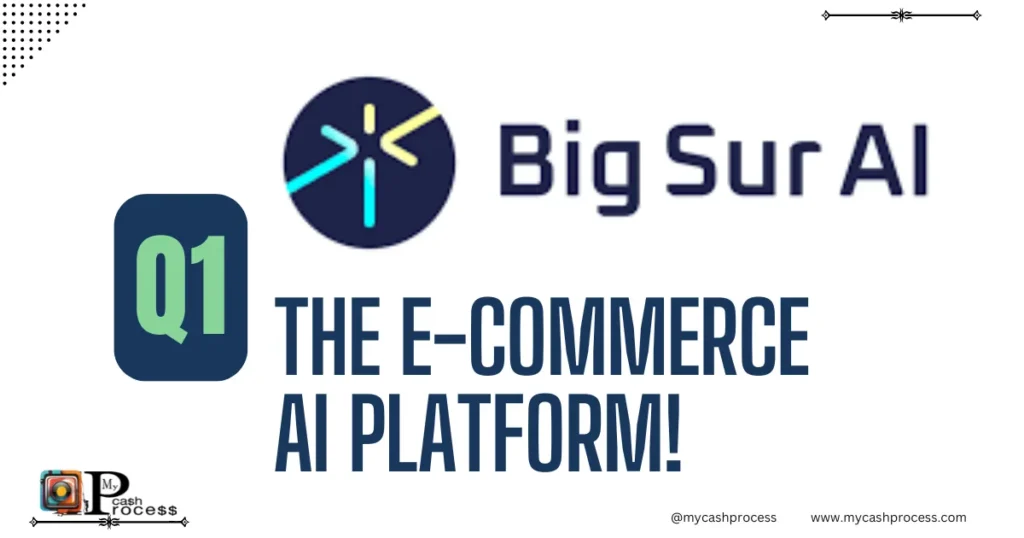Introduction
In today’s fast-evolving digital commerce landscape, businesses must leverage cutting-edge technologies to stay ahead of the competition. One of the most revolutionary advancements in this space is AI-driven e-commerce platforms, which are transforming the way businesses operate and engage with customers. Among these innovations, Big Sur AI: the e-commerce AI platform stands out as a game-changer, offering unparalleled solutions for businesses seeking a seamless omnichannel e-commerce platform experience.
With the rise of artificial intelligence in e-commerce, traditional platforms are being replaced by AI-driven solutions that provide automation, predictive analytics, and enhanced security measures. As businesses strive to enhance customer experience and operational efficiency, Big Sur AI has emerged as a leading e-commerce AI platform that is setting new standards in the industry.
This article explores how Big Sur AI: the e-commerce AI platform is reshaping the digital marketplace, focusing on its key features, benefits, and future potential. It also addresses concerns related to we-commerce platform safety, ensuring that businesses can operate in a secure and efficient environment.
Quick Access Guide
How Big Sur Ai: the E-Commerce AI platform Is Redefining E-Commerce
The global e-commerce industry is undergoing a transformation, with AI playing a pivotal role in shaping its future. Big Sur ai: the e-commerce ai platform is at the forefront of this change, offering advanced solutions that enhance personalization, optimize supply chains, and improve customer interactions.
The Role of AI in Modern E-Commerce
- Personalized Shopping Experience: AI algorithms analyze customer behavior to provide tailored recommendations and targeted promotions.
- Automated Customer Support: AI-powered chatbots and virtual assistants enhance customer service by providing instant responses and solutions.
- Predictive Analytics: Machine learning models forecast consumer demand and inventory needs, reducing waste and improving efficiency.
Key Benefits of Big Sur AI: The e-commerce AI Platform
| Feature | Benefit |
|---|---|
| AI-Powered Recommendations | Increases sales by suggesting personalized products |
| Automated Order Processing | Reduces manual workload and enhances operational efficiency |
| Advanced Fraud Detection | Ensures we-commerce platform safety and protects customer data |
| Multi-Channel Integration | Seamlessly connects online and offline sales channels |
| Real-Time Analytics | Helps businesses make data-driven decisions |
The Core Features of Big Sur AI: The E-Commerce AI platform
1. AI-Powered Personalization
Big Sur AI: the e-commerce AI platform uses advanced machine learning algorithms to analyze customer data and create highly personalized shopping experiences. This technology helps businesses deliver customized product recommendations, targeted advertisements, and personalized content that increases engagement and conversion rates.
2. Intelligent Inventory Management
One of the biggest challenges in e-commerce is inventory management. Big Sur AI utilizes real-time tracking and predictive analytics to ensure businesses maintain the right stock levels.
3. Seamless Integration with Omnichannel E-Commerce Platforms
The integration of Big Sur AI: the e-commerce AI platform with omnichannel e-commerce platforms allows businesses to provide a consistent shopping experience across multiple touchpoints, including:
- Online stores
- Physical retail locations
- Social media marketplaces
- Mobile apps
Why Omnichannel E-Commerce Platforms Need AI Integration
What is an Omnichannel E-Commerce Platform?
An omnichannel e-commerce platform is a system that integrates multiple sales and communication channels into a unified experience. Big Sur AI: the e-commerce AI platform enhances this by synchronizing customer data, inventory, and marketing efforts across all platforms.
Benefits of AI in Omnichannel E-Commerce Platforms
- Real-Time Data Synchronization – Ensures customers receive consistent pricing and promotions across all channels.
- Automated Customer Journey Mapping – Tracks and predicts user behavior across different touchpoints.
- Efficient Marketing Campaigns – AI-driven insights help businesses create personalized email and ad campaigns.
Big sur ai: the e-commerce AI platform and We-Commerce Platform Safety
Security remains a top priority for e-commerce businesses, as cyber threats and fraud continue to evolve. Big Sur AI: the e-commerce AI platform integrates state-of-the-art security features to ensure we-commerce platform safety.
How Big Sur ai Enhances E-Commerce Security
- AI-Powered Fraud Detection – Uses real-time anomaly detection to flag suspicious activities.
- End-to-End Encryption – Ensures secure transactions and protects customer data.
- Automated Compliance Checks – Helps businesses adhere to global e-commerce regulations.
Case Study: Reducing Fraud in Online Transactions
A leading online retailer integrated Big Sur ai to enhance its security framework. The result? A 35% reduction in fraudulent transactions within the first six months.
How big sur ai: the e-commerce ai platform Enhances Customer Experience
Customer experience is a major factor in e-commerce success. Big Sur ai: the e-commerce AI platform improves it by implementing AI-driven personalization, faster response times, and predictive analytics.
AI-powered chatbots and Virtual Assistants
One of the standout features of Big Sur AI is its AI-powered chatbots that provide real-time customer support. These chatbots use natural language processing (NLP) to offer instant responses, resolve issues, and guide customers through their buying journey.
Personalized Product Recommendations
AI algorithms analyze a customer’s browsing history, purchase patterns, and preferences to deliver highly targeted recommendations. This helps businesses:
- Increase sales conversion rates
- Enhance customer satisfaction
- Reduce cart abandonment
AI-Powered Search and Voice Commerce
With voice search becoming more popular, Big Sur AI: the e-commerce AI platform supports voice-enabled shopping experiences, making it easier for customers to find and purchase products.
Real-World Case Studies: How Businesses Are Benefiting from Big Sur Ai
Case Study 1: Retail Brand Boosts Sales by 45% with AI Integration
A leading fashion retailer implemented Big Sur AI: the e-commerce AI platform to improve personalization and marketing efforts. The results:
- 45% increase in online sales
- 30% decrease in customer churn
- Enhanced engagement through automated product suggestions
Case Study 2: AI-Driven Fraud Prevention for an Online Electronics Store
An electronics retailer faced increasing fraud issues. By integrating Big Sur Ai, the company experienced:
- 60% reduction in fraudulent transactions
- Improved customer trust and brand reputation
- Enhanced compliance with payment security standards

The Future of Omnichannel E-Commerce Platform with Big Sur Ai
AI is shaping the future of omnichannel e-commerce platforms, and Big Sur AI: the e-commerce AI platform is leading this transformation.
Upcoming Trends in AI-Powered E-Commerce
- Hyper-Personalization – AI will deliver even more accurate product recommendations based on real-time data.
- Augmented Reality (AR) Shopping – Virtual try-ons and interactive experiences will become standard.
- Predictive Inventory Management – AI will anticipate stock demand and optimize supply chains.
- Sustainable AI Solutions – AI will help businesses reduce waste and carbon footprint.
How to Implement big sur ai: the e-commerce ai platform in Your Business
Step 1: Assess Your E-Commerce Needs
Determine which areas need improvement:
✅ Customer personalization
✅ Inventory optimization
✅ Marketing automation
✅ Fraud detection
Step 2: Integrate Big Sur AI with Your Existing Platform
Big Sur Ai: the e-commerce AI platform supports seamless integration with major e-commerce platforms like:
- Shopify
- WooCommerce
- Magento
- Custom-built stores
Step 3: Monitor and Optimize Performance
AI models require continuous data input to improve efficiency. Regularly monitor key metrics like:
Conversion rates
Customer engagement
Fraud detection accuracy
The Role of AI in Predicting Consumer Behavior
In the ever-evolving landscape of online shopping, businesses are constantly seeking innovative ways to understand their customers better. Artificial intelligence has emerged as a game-changer, enabling e-commerce platforms to analyze massive datasets and predict consumer behavior with remarkable accuracy.
How AI-Powered Data Analysis Helps Businesses Anticipate Customer Preferences
AI-driven data analysis processes vast amounts of customer data, including browsing history, purchase patterns, and engagement metrics. By leveraging machine learning algorithms, businesses can:
- Identify trends in customer preferences.
- Offer highly personalized recommendations.
- Optimize product placements for maximum visibility.
The Importance of Machine Learning in Understanding Shopping Patterns
Machine learning enhances the ability to recognize patterns in consumer behavior. Key applications include:
- Analyzing seasonal buying trends.
- Detecting shifts in consumer demand.
- Identifying repeat purchase tendencies to suggest relevant products.
Case Studies of Brands Using AI for Demand Forecasting
Leading e-commerce giants are already utilizing AI to forecast demand:
- Amazon: Uses predictive analytics to anticipate inventory needs before orders are placed.
- Zalando: Implements AI to detect fashion trends and adjust stock accordingly.
- Sephora: Utilizes AI-driven insights to offer personalized beauty product recommendations.
Benefits of Personalized Marketing Based on Predictive Analytics
By predicting consumer behavior, businesses can:
- Improve targeted advertising campaigns.
- Enhance customer retention through customized shopping experiences.
- Optimize pricing strategies based on demand fluctuations.
Challenges and Ethical Concerns Regarding Consumer Data Usage
Despite its advantages, AI-driven consumer behavior analysis comes with challenges:
- Data Privacy Issues: Collecting and analyzing customer data raises concerns about privacy.
- Bias in AI Algorithms: Inaccurate or biased data can lead to unfair targeting.
- Regulatory Compliance: Businesses must adhere to data protection laws like GDPR and CCPA.
Enhancing Supply Chain Efficiency with AI
AI is transforming supply chain management, making operations faster, smarter, and more cost-effective. By automating key processes, businesses can optimize inventory, streamline logistics, and reduce human errors.
AI-Driven Automation in Inventory Management and Logistics
AI enhances inventory tracking by:
- Predicting stock levels based on sales data.
- Automating reordering processes to prevent stockouts.
- Reducing waste by optimizing warehouse storage.
How Predictive Analytics Optimize Stock Levels and Reduce Waste
Predictive analytics helps businesses:
- Identify slow-moving products and adjust stock accordingly.
- Anticipate seasonal demands to prevent overstocking.
- Reduce losses by preventing product expiration.
The Role of AI in Streamlining Order Fulfillment and Delivery Tracking
AI-powered logistics improve:
- Order accuracy: Automated picking and packing ensure fewer errors.
- Delivery speed: AI-driven route optimization enhances last-mile delivery efficiency.
- Customer experience: Real-time tracking updates provide transparency.
Reducing Operational Costs Through Smart Supply Chain Solutions
AI minimizes operational expenses by:
- Reducing manual labor in warehouses.
- Enhancing fuel efficiency through optimized delivery routes.
- Minimizing waste and excess inventory storage costs.
Real-World Examples of Companies Improving Efficiency with AI
- Walmart: Uses AI to predict stock demand and reduce waste.
- UPS: Optimizes delivery routes using AI-based logistics software.
- IKEA: Automates warehouse management for faster order fulfillment.
Future Trends in AI-Powered E-Commerce
AI is set to redefine the future of e-commerce, bringing unprecedented changes in personalization, automation, and security. Businesses that stay ahead of these trends will gain a competitive edge.
The Impact of AI on Hyper-Personalized Shopping Experiences
AI is making shopping experiences more personalized than ever through:
- Real-time product recommendations based on user behavior.
- Virtual try-on tools for fashion and beauty products.
- AI-driven chatbots that provide customized customer support.
Advancements in Natural Language Processing for Chatbots and Virtual Assistants
E-commerce platforms are integrating sophisticated chatbots powered by NLP (Natural Language Processing), which:
- Understand and respond to customer queries in real-time.
- Assist with product searches and troubleshooting.
- Provide 24/7 customer support, reducing reliance on human agents.
The Rise of Voice Commerce and AI-Driven Product Recommendations
Voice-activated shopping is on the rise, with platforms like:
- Amazon Alexa: Allows users to place orders using voice commands.
- Google Assistant: Helps users compare prices and find products.
- Apple Siri: Enables hands-free shopping and checkout processes.
How Blockchain and AI Can Work Together for Secure Transactions
The integration of AI and blockchain ensures:
- Secure online transactions with real-time fraud detection.
- Enhanced data privacy by decentralizing customer information.
- Smart contract automation for seamless order processing.
Predictions for AI’s Role in Shaping the Next Generation of Online Retail
- AI-powered virtual shopping assistants will become mainstream.
- Augmented reality (AR) shopping experiences will revolutionize online retail.
- AI-driven sustainability efforts will optimize eco-friendly logistics and supply chains.
Conclusion
The Future of E-Commerce
The future of e-commerce lies in the power of AI. Businesses that embrace AI-driven solutions will stay competitive in an ever-evolving market. With advanced features, seamless integration across various channels, and robust safety measures, these platforms are transforming how businesses operate and engage with customers.
Warning
Neglecting AI in your e-commerce strategy can result in lower conversion rates and increased operational costs. Failing to adopt AI-driven approaches may leave your business struggling to keep up with the competition.
Follow us on Pinterest, Twitter X, Facebook, Instagram, Quora, TikTok, Discord, YouTube, and WhatsApp Channel.
Advice
✅ Begin incorporating AI-powered automation into your e-commerce strategy today.
✅ Leverage advanced AI tools for personalization, fraud prevention, and marketing automation.
✅ Continuously update AI models with real-time data to ensure they remain accurate and effective.
FAQs
Q1: How does AI improve an omnichannel e-commerce platform?
AI synchronizes customer data, inventory, and marketing efforts across all sales channels, providing a smooth and consistent shopping experience.
Q2: Is AI integration safe for e-commerce platforms?
Yes, advanced AI solutions include fraud detection, data encryption, and compliance tools to ensure e-commerce platform security.
Q3: What types of businesses can benefit from AI technology?
Any e-commerce business, whether a small startup or a large enterprise, can benefit from using AI to enhance efficiency, increase sales, and bolster security.
Q4: Can I integrate AI with my existing online store?
Yes, AI can be integrated with popular platforms like Shopify, WooCommerce, Magento, and even custom-built stores.
Q5: How do I get started with AI solutions?
Assess your business needs, integrate the platform, and monitor its performance to maximize the benefits it offers.




